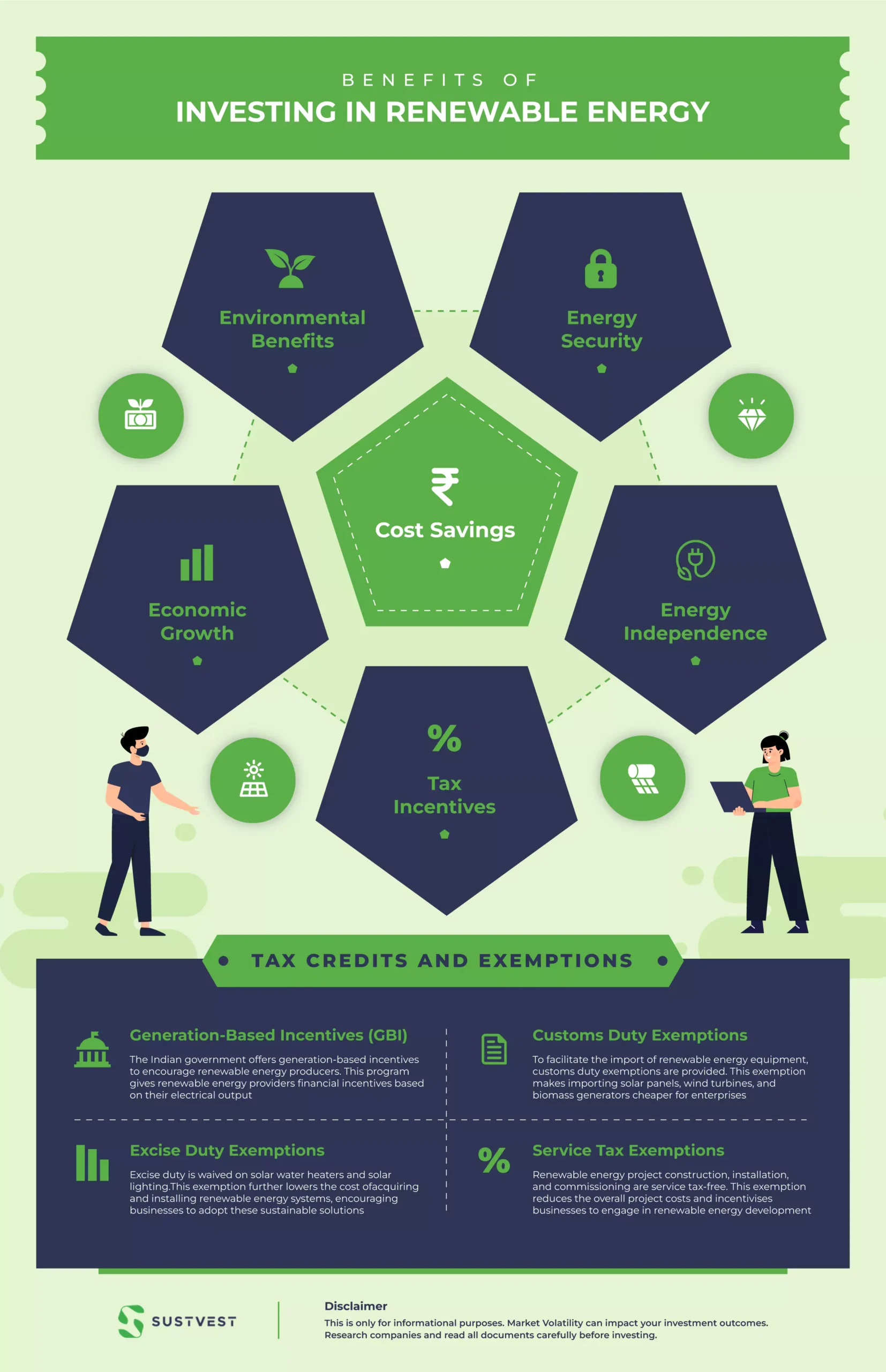Renewable energy drives India’s sustainable development and energy security. To encourage firms to engage in renewable energy projects, the Indian government has created a variety of tax advantages.
These incentives not only aim to reduce the nation’s carbon footprint but also provide numerous financial benefits for businesses.
This article will examine Indian renewable energy tax advantages and advise enterprises on how to use them. By understanding the tax landscape, businesses can make informed decisions and contribute to India’s clean energy revolution.

Growth and Potential of Renewable Energy in India
Renewable energy has grown rapidly in India over the past decade. To fulfil it’s expanding energy needs while reducing environmental effects, the government has expanded renewable energy sources. By 2030, India wants 450 GW of renewable energy capacity.
India’s renewable energy expansion has many causes. The government has implemented favourable policies and incentives to attract investments and promote clean energy generation. Programs like the National Solar Mission and the Wind Energy Program have driven renewable energy uptake.
India’s solar power capacity has particularly surged, with declining costs of solar panels and supportive policies. The country has become a global solar market using its abundant solar resources. Wind power is another major contributor, with India having the most installed wind capacity.
Renewable energy has tremendous growth potential. India has abundant solar, wind, hydro, and biomass power generation resources.
Continued investments, technological advancements, and favourable policies will further propel the renewable energy sector, helping India achieve its sustainable development goals while reducing carbon emissions and dependence on fossil fuels.
Benefits of Investing in Renewable Energy
Investing in renewable energy has several environmental and economic benefits. One notable advantage is the availability of tax incentives for renewable energy projects, which further enhances the attractiveness of such investments.
1. Environmental Benefits
Renewable energy, such as solar electricity in India, has considerable environmental benefits. Solar energy reduces greenhouse gas emissions and air pollution. India exempts solar power plants from taxes.
Additionally, the government provides tax exemptions for solar power projects in India. This incentivises solar energy investments, making it financially more attractive for individuals and businesses.
Tax exemptions stimulate solar power adoption, resulting in more clean energy generation and a lower carbon footprint.
2. Energy Security
Renewable energy reduces fossil fuel and imported energy use, improving energy security. This strengthens self-sufficient energy systems.
Additionally, tax incentives for renewable energy projects encourage further investment by providing financial benefits to investors.
These incentives can include tax credits, accelerated depreciation, or tax exemptions. By diversifying the energy mix and utilising tax incentives, countries can bolster their energy independence and reduce vulnerability to fuel price fluctuations.
3. Economic Growth
Renewable energy investments boost economic growth by producing manufacturing, installation, operations, and maintenance jobs. The renewable energy sector fosters innovation and attracts R&D investments by providing value-chain jobs.
This job creation boosts local economies and provides income and career prospects for individuals.
Additionally, the renewable energy industry also boosts a nation’s economy by attracting investments and advancing technology.
4. Cost Savings
Renewable energy can reduce long-term costs. As renewable energy technology improves and economies of scale are realised, renewable energy costs continue to fall. This is because solar and wind energy has no fuel expenditures, unlike fossil fuels.
Moreover, ongoing technological advancements make renewable energy systems more efficient, further reducing costs over time. These cost savings make renewable energy investments financially attractive and economically beneficial in the long run.
5. Energy Independence
Renewable energy reduces fossil fuel imports and increases energy independence. This decreases vulnerability to fuel price fluctuations and geopolitical tensions.
By harnessing domestic renewable resources, countries can generate their own clean energy, thereby achieving greater control over their energy supply.
This improves energy security, reduces fossil fuel imports, and boosts energy system resilience.
6. Tax Incentives
Investing in renewable energy often comes with tax incentives. Governments use tax credits, subsidies, grants, and other financial incentives to support renewable energy investments. These incentives can include tax credits, accelerated depreciation, or tax exemptions.
By offering such incentives, governments aim to make renewable energy investments more financially appealing and profitable for investors.
This increases renewable energy industry involvement and accelerates the transition to a clean and sustainable energy future.

Tax Credits and Exemptions
Tax credits and exemptions are one of the Indian government’s incentives for renewable energy. These incentives lessen businesses’ financial burden and make renewable energy projects more economically viable.
Here are some important aspects of tax credits and exemptions for renewable energy in India:
- Generation-Based Incentives (GBI): The Indian government offers generation-based incentives to encourage renewable energy producers. This program gives renewable energy providers financial incentives based on their electrical output. The GBI provides a direct financial benefit to businesses, making renewable energy projects financially attractive.
- Customs Duty Exemptions: To facilitate the import of renewable energy equipment, customs duty exemptions are provided. This exemption makes importing solar panels, wind turbines, and biomass generators cheaper for enterprises.
- Excise Duty Exemptions: Excise duty is waived on solar water heaters and solar lighting. This exemption further lowers the cost of acquiring and installing renewable energy systems, encouraging businesses to adopt these sustainable solutions.
- Service Tax Exemptions: Renewable energy project construction, installation, and commissioning are service tax-free. This exemption reduces the overall project costs and incentivises businesses to engage in renewable energy development.
Businesses can decrease their tax liability and boost their renewable energy project ROI by taking advantage of these tax incentives.
It is advisable for businesses to consult with tax professionals or experts to navigate the complex tax landscape and optimise their tax benefits.
Ultimately, these tax credits and exemptions play a pivotal role in accelerating the adoption of renewable energy in India, driving both environmental sustainability and financial prosperity.
Challenges and Considerations
While renewable energy presents numerous benefits, it also faces several challenges and considerations that need to be addressed:
- Grid Integration: Integrating large amounts of renewable energy into the existing power grid can be challenging. Upgrades and investments in grid infrastructure and smart grid technologies are necessary to accommodate variable and decentralised sources of energy.
- Cost and Financing: While the cost of renewable energy has been decreasing, upfront investment costs can still be substantial. In poor countries, financing and securing private investment for renewable energy projects is difficult.
- Policy and Regulatory Framework: Clear and consistent policies, regulations, and long-term incentives are crucial for creating a favourable investment environment and ensuring a level playing field for renewable energy. Policy stability and transparency are essential to instil investor confidence.
- Land and Resource Availability: Expanding renewable energy infrastructure requires significant land and resource availability. Balancing land-use priorities, environmental impacts, and community engagement is important for sustainable and responsible project development.
- Skills and Workforce Development: Building a skilled workforce capable of designing, operating, and maintaining renewable energy systems is essential. Training programs and educational initiatives are needed to address the skills gap in the renewable energy sector.
- Public Acceptance and Perception: Overcoming public resistance or perception challenges is important for the successful implementation of renewable energy projects. Raising awareness, engaging local communities, and addressing concerns related to visual impacts, noise, and land use can help garner public support.
- Technology Advancements: Research and development are needed to increase renewable energy technology, efficiency, and affordability. Innovation and industry-academia-research partnerships are essential.
FAQs
What types of tax incentives are available for renewable energy investments in India?
Renewable energy projects in India receive tax benefits, accelerated depreciation, and exemptions.
Are these tax incentives applicable to all renewable energy sources in India?
Yes, tax incentives are available for solar, wind, hydro, biomass, and geothermal energy.
Do tax incentives for renewable energy have a specific duration in India?
The duration of tax incentives for renewable energy can vary. Some incentives have fixed durations, while others may be subject to periodic reviews and extensions by the government.
How can businesses or individuals claim tax incentives for their renewable energy investments?
To claim tax incentives, investors need to comply with the eligibility criteria and documentation requirements outlined by the government, typically through their tax filings.
Can tax incentives be combined with other financial incentives or grants for renewable energy projects?
Yes, tax incentives can be combined with other financial incentives and grants available in India, such as subsidies and grants from government schemes, to further support and enhance the viability of renewable energy investments.
Conclusion
Tax incentives for renewable energy in India play a pivotal role in driving investments and fostering the growth of the sector.
These incentives benefit investors financially and make renewable energy projects more financially attractive and viable. Tax credits, accelerated depreciation, and exemptions support renewable energy adoption, promoting environmental sustainability, energy security, and economic prosperity.
However, it is crucial for policymakers to ensure the stability and longevity of these incentives to provide investors with a predictable and supportive business environment, further accelerating India’s renewable energy transition.
Why Make an Investment in Renewable Energy in India? Because it presents an opportunity to contribute to environmental sustainability, energy security, and economic prosperity, all while benefiting from attractive financial incentives.
Ready to make a difference with your investments? Join us at SustVest, where your money works not just for you but also for a greener and more sustainable future.

Founder of Sustvest
Hardik completed his B.Tech from BITS Pilani. Keeping the current global scenario, the growth of renewable energy in mind, and people looking for investment opportunities in mind he founded SustVest ( formerly, Solar Grid X ) in 2018. This venture led him to achieve the ‘Emerging Fintech Talent of the Year in MENA region ‘ in October 2019.




